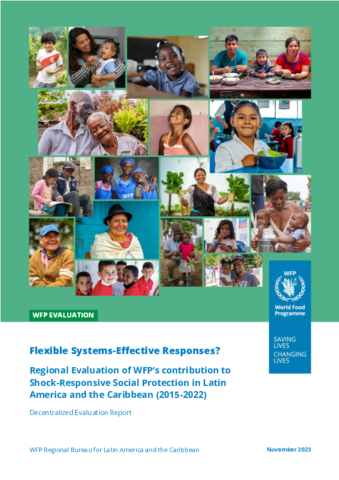
This formative regional evaluation has two main objectives: learning and accountability. Emphasizing learning, the evaluation aims to understand high-level outcomes and extract lessons and good practices. For accountability, it identifies the results achieved from implementing the SRSP framework and pillar of the Regional Social Protection Strategy (2019) by WFP in LAC. The evaluation assessed the coherence, effectiveness, efficiency, sustainability, and gender and inclusion aspects of WFP’s engagement in SRSP. The evaluation adopted a mixed-methods approach and followed a utilization-focused and theory-based approach, using outcome mapping to assess WFP’s contribution to strengthening shock-responsive SP systems in LAC.
The evaluators concluded that WFP's engagement in SRSP in the LAC region has shown positive effects in improving coverage, transparency, and financial inclusion. WFP has been able to build on its comparative advantages, and good practices, such as collaboration with sub-regional institutions, gender equality efforts, and leveraging school feeding programs, have shown promising results. Challenges include external factors like varying government engagement and reception capacity, as well as internal aspects such as staff turnover and resource constraints. While recognizing the need to tailor the support, WFP's operational SRSP Guidance offers methodology to structure engagement with counterparts at country level. Further opportunities lie in advocacy work for national budgets to be allocated for social protection.
WFP's evidence generation and related policy advocacy efforts have played a significant role in raising awareness about social protection and shock-preparedness and response. This has led to improved coordination and partnerships with governments and other key stakeholders and, to varying degree across countries, a stronger positioning of the topic on national agendas. However, as more stakeholders engage in SRSP, there is a growing demand for further strengthening this coordination and alignment to foster synergies and avoid duplication and conflicting demands on government resources.
WFP has significantly increased resources deployed for SRSP activities, including staff recruitment, training, evidence generation, advocacy, and project seed funding. The organization's adaptability and recognition of the growing importance of SRSP are evident. However, initially strategic reliance on short-term contracts starts showing its limitations and moving forward an appropriate staffing mix including national professional positions becomes important to enhance retention and financial sustainability.
Seven recommendations were made to WFP moving forward. These suggested establishing more structured platforms for knowledge sharing, continuing positioning WFP as a key partner to national governments in regard to SRSP, continuing generation of robust evidence and internal and external capacity strengthening, continuing the support of digitalization processes and seizing the opportunity to enhance integration of gender-sensitivity, inclusion and potentially transformative attributes.



